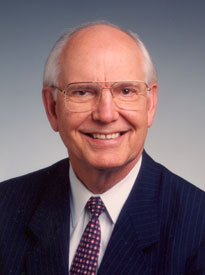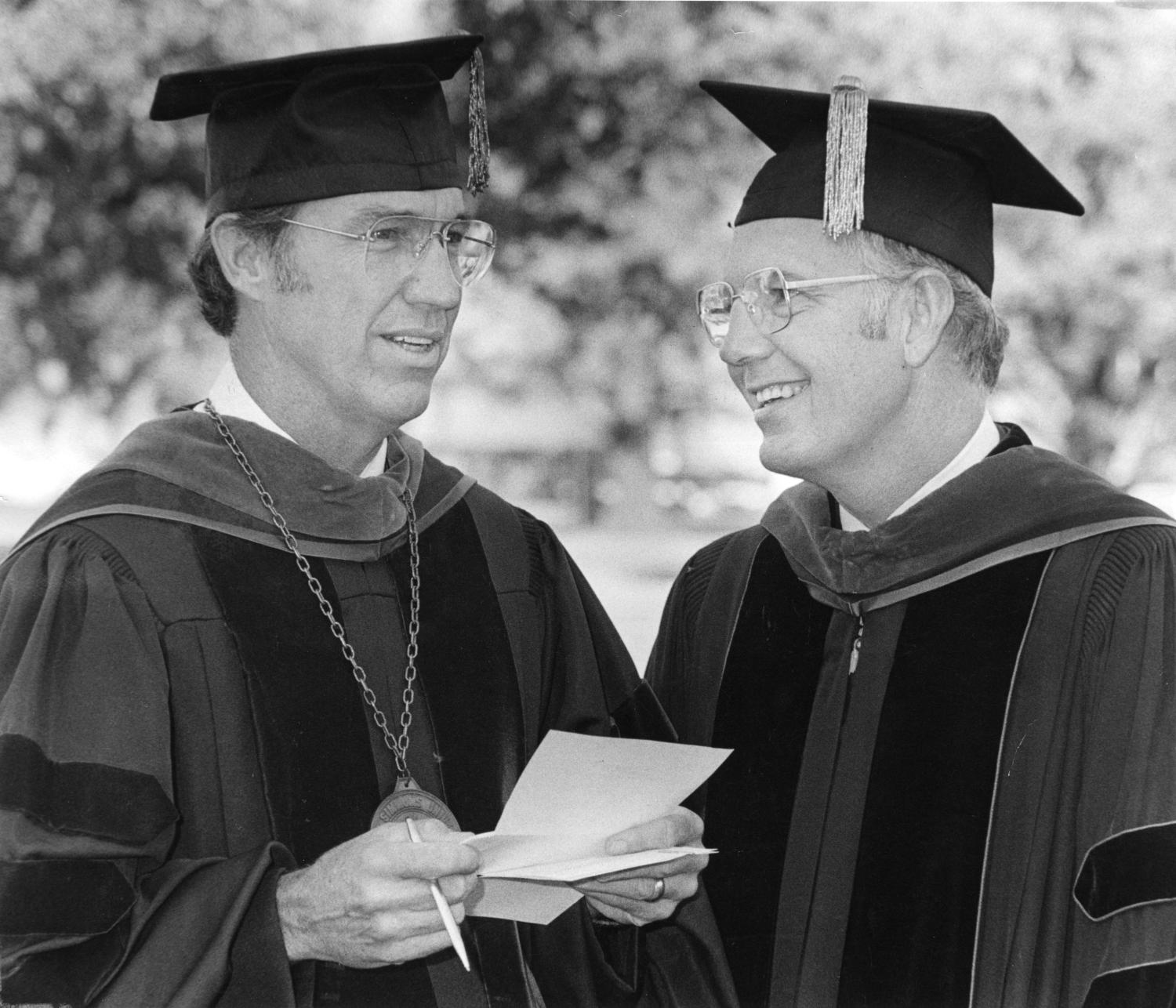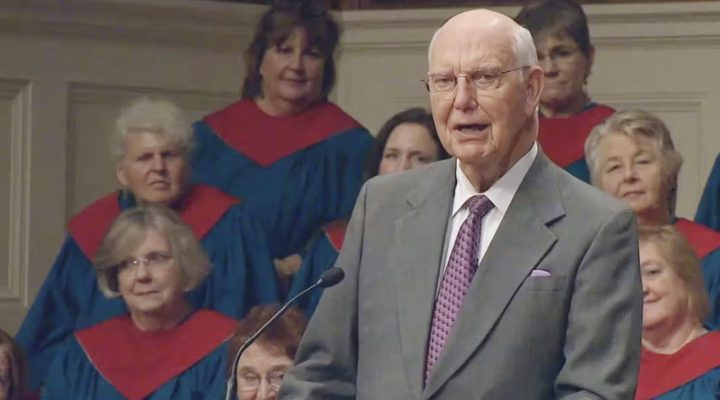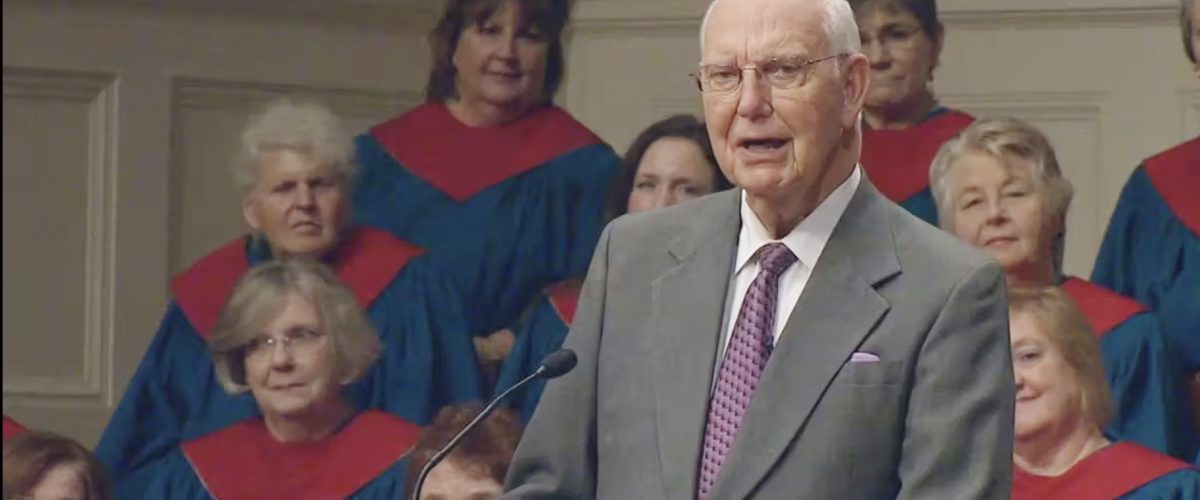Peter James Flamming, one of the best-known “moderate” Southern Baptist preachers of the 20th century, died in Richmond, Va., March 27, at age 89.
In 1986, Flamming joined the Southern Baptist Convention’s Peace Committee to fill the spot vacated by the resignation of Cecil Sherman, who had quit after the six SBC seminary presidents released a statement affirming the Bible as “not errant” in an effort to appease the fundamentalist movement demanding they believe in biblical “inerrancy.”
Flamming served the final year of the committee’s two-year task to seek peace and reconciliation between “moderate” and “conservative” Southern Baptists who were battling over the authority of Scripture and control of denominational entities. Ultimately, the efforts to bridge that chasm were unsuccessful, leading to creation of two breakaway groups that became the Alliance of Baptists and the Cooperative Baptist Fellowship — and the rightward shift of the SBC.

James Flamming
At the time, Flamming served as pastor of First Baptist Church of Richmond, Va., located down the street from the headquarters of the SBC Foreign Mission Board, which made him pastor to many SBC employees.
Church historian Fred Anderson called Flamming a “bridge builder.” Anderson said Flamming wrote heartfelt letters to those “on the other side,” letting them know he was praying for them. In an act that seems implausible today, Flamming held his Richmond congregation together as some congregants remained loyal to the SBC and others were part of forming the new organizations. Anderson said Flamming “sustained stewardship and fellowship” among a diverse congregation.
One of the new enterprises that arose from the SBC schism was the creation of several new seminaries and divinity schools, including George W. Truett Seminary at Baylor University, where Flamming served as a board member, and Baptist Theological Seminary at Richmond, where he served as adjunct professor of preaching.
There, he “advocated for and encouraged women in preaching,” according to an article published by First Baptist Richmond.
In 1984, messengers to the SBC annual meeting narrowly adopted a controversial resolution saying, “The Scriptures attest to God’s delegated order of authority (God the head of Christ, Christ the head of man, man the head of woman, … distinguishing the roles of men and women in public prayer and prophecy” and “the Scriptures teach that women are not in public worship to assume a role of authority over men lest confusion reign in the local church” and “while Paul commends women and men alike in other roles of ministry and service, he excludes women from pastoral leadership to preserve a submission God requires because the man was first in creation and the woman was first in the Edenic fall.”
Flamming wrote an article for the Richmond Times-Dispatch in which he called the resolution a “perversion of the gospel of Jesus Christ.”
The pastor was no stranger to taking public stands on issues of the day that mattered to him. In 1969, while serving as pastor of First Baptist Church of Abilene, Texas, a debate arose about whether Texas Baptist colleges and universities should accept federal loans.
Advocating against such entanglement was Howard E. Butt, a high-profile layman from Corpus Christi, who thundered: “To marry the institutional church to the institutional government — before Jesus Christ comes again — is prostitution. It is to play the harlot. It is to play the whore.”
Flamming was among those who opposed Butt and urged Texas Baptists to allow their schools to accept federals loans that would be paid back with interest.
Butt’s position insulted sincere Christians on the other side of the issue, Flamming said. “Secularism of society is our real enemy today. Without strongly supported Christian education, we can’t fight secularism.”

James Flamming, right, a 1955 graduate of Hardin-Simmons University and then pastor of First Baptist Church of Abilene, chats with HSU President Jesse Fletcher at the opening convocation of a new semester. Year unkown.
While pastor at Abilene, Flamming became a beloved community leader and had close ties with Hardin-Simmons University, a Texas Baptist school where he had earned a bachelor’s degree and had played football on scholarship.
Originally a music major, Flamming changed course during his sophomore year to become a pastor. He graduated with a history degree and then earned a bachelor of divinity degree and doctor of theology degree from Southwestern Baptist Theological Seminary in Fort Worth.
At HSU, Flamming met Shirley Northcutt, the daughter of a former pastor of First Baptist Church in Abilene. They married in 1955 and began their ministry at Bethel Baptist Church in Eastland, Texas. Then he was named director of the Baptist Student Union and Bible teacher at Texas Women’s University in Denton, Texas, followed by a stint as associate pastor of Park Cities Baptist Church and then Royal Lane Baptist Church, both in Dallas.
Just 11 years after graduating from HSU and leaving Abilene, Flamming was called to serve as pastor of First Baptist Church there, where his father-in-law once served. He led there 17 years, from 1966 to 1983.
While there, he served on the board of trustees for HSU and for Hendrick Medical Center, and as chairman of the Executive Committee of the Baptist General Convention of Texas, among many other denominational roles.
In 1983, the Flammings moved to Richmond, where he served as pastor 23 years, until retiring on Dec. 31, 2006.
The Flammings were deeply involved in foreign mission work across the years, with ties to mission work in in Kenya, Tanzania, Brazil, Spain, Costa Rica, China, Hong Kong, Austria and England.
In Abilene and Richmond, Flamming developed a reputation as a pastor to the community, not just to the church.
A remembrance published by First Baptist Richmond explained: “Flamming’s legacy will undoubtedly shine on through the people of the church — countless who still speak of the beloved pastor dedicating their baby, baptizing, marrying them or shepherding them through difficulty of loss. The same might be said for just as many outside the church, since one could rarely go anywhere around Richmond without being approached by ‘members’ of the television congregation.”
His reputation as a bridge builder spanned from Texas to Virginia and across Baptist groups.
His reputation as a bridge builder spanned from Texas to Virginia and across Baptist groups, including the Baptist World Alliance.
In Abilene, he took the bold step of opening the all-white First Baptist Church for prayer after the murder of Martin Luther King Jr. in Memphis. He did not seek approval from church leaders; he simply responded to the need in the moment.
The article from First Baptist Richmond said of Flamming: “Spiritual nudges were key in bridge building and peacemaking.”
Jim Somerville, who followed Flamming at the Richmond church, said of his friend and predecessor: “We were blessed beyond means with his compassion and love, and he will always have a special place in our hearts.”
Flamming was preceded in death by his wife, Shirley, in 2017, and their son, Peter Dave, in 1991. He is survived by his sister, Verva Lacy of Amarillo, Texas; two sons, Jesse Dee Flamming of Fort Worth, and James Douglas Flamming of Atlanta; and sister-in-law Jessie Ann Cook; seven grandchildren and seven great-grandchildren.
A memorial service will held Saturday, April 1, in the Sanctuary of Richmond’s First Baptist Church and will be livestreamed on the church website.
Related article:


